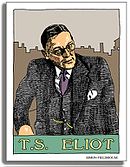
Thomas Stearns Eliot was a poet, essayist and playwright. He was a leading figure in English-language Modernist poetry where he reinvigorated the art through the use of language, writing style, and verse structure. He is also noted for his critical essays, which often re-evaluated long-held cultural beliefs.
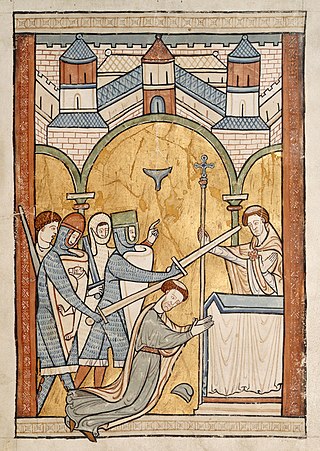
Murder in the Cathedral is a verse drama by T. S. Eliot, first performed in 1935. The play portrays the assassination of Archbishop Thomas Becket in Canterbury Cathedral during the reign of Henry II in 1170. Eliot drew heavily on the writing of Edward Grim, a clerk who was an eyewitness to the event.

Joan Mary Waller Greenwood was an English actress. Her husky voice, coupled with her slow, precise elocution, was her trademark. She played Sibella in the 1949 film Kind Hearts and Coronets, and also appeared in The Man in the White Suit (1951), Young Wives' Tale (1951), The Importance of Being Earnest (1952), Stage Struck (1958), Tom Jones (1963) and Little Dorrit (1987).
Edward Dahlberg was an American novelist, essayist, and autobiographer.

William Albert Henry was an American actor who worked in both films and television.
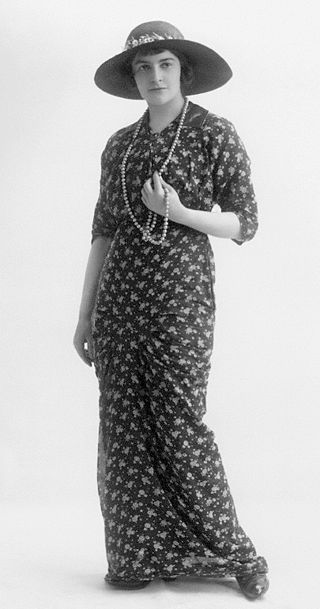
Cathleen Nesbitt was an English actress.
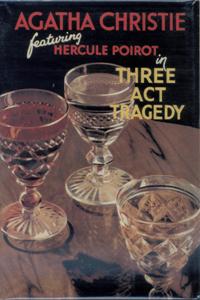
Three Act Tragedy is a work of detective fiction by British writer Agatha Christie, first published in the United States by Dodd, Mead and Company in 1934 under the title Murder in Three Acts and in the UK by the Collins Crime Club in January 1935 under Christie's original title. The US edition retailed at $2.00 and the UK edition at seven shillings and sixpence (7/6).

Charles Henry Pywell Daniell was an English actor who had a long career in the United States on stage and in cinema. He came to prominence for his portrayal of villainous roles in films such as Camille (1936), The Great Dictator (1940), Holiday (1938) and The Sea Hawk (1940). Daniell was given few opportunities to play sympathetic or 'good guy' roles; an exception was his portrayal of Franz Liszt in the biographical film of Robert and Clara Schumann, Song of Love (1947). His name is sometimes spelled "Daniel".

The Lady from Dubuque is a play by Edward Albee, which premiered on Broadway in 1980 for a brief run. The play ran in London in 2007.

Benjamin Arthur Flemyng, known professionally as Robert Flemyng, was a British actor. The son of a doctor, and originally intended for a medical career, Flemyng learned his stagecraft in provincial repertory theatre. In 1935 he appeared in a leading role in the West End, and the following year had his first major success, in Terence Rattigan's comedy French Without Tears. Between then and the Second World War he appeared in London and New York in a succession of comedies.

Irene Worth, CBE, born Harriett Elizabeth Abrams, was an American stage and screen actress who became one of the leading stars of the British and American theatre. She pronounced her first name with three syllables: "I-REE-nee".
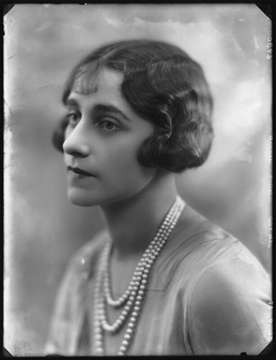
Alison Joy Leggatt was an English character actress.
The Family Reunion is a play by T. S. Eliot. Written mostly in blank verse, it incorporates elements from Greek drama and mid-twentieth-century detective plays to portray the hero's journey from guilt to redemption. The play was unsuccessful when first presented in 1939, and was later regarded as unsatisfactory by its author, but has been successfully revived since the 1940s. Some critics have thought aspects of the tormented hero reflect Eliot's difficulties with his estrangement from his first wife.
Whodunnit? is a play written by Anthony Shaffer in 1977, originally called The Case of the Oily Levantine.

Hugh Sinclair was a British actor. He trained for the stage at the Royal Academy of Dramatic Art in London and had a career spanning forty years in theatre, film and television. He worked in Britain and America with some of the 20th Century's most highly regarded actors and directors, including Ray Milland, Elisabeth Bergner, George Cukor and Carol Reed. His principal work was made in the theatre and he headed the cast of two landmark plays in London, Noël Coward's Private Lives in 1945 and the original London production of TS Eliot's The Cocktail Party in 1950. However notable films include Escape Me Never, A Girl Must Live, The Rocking Horse Winner and Circle of Danger. He excelled in light comedy and was known for his comic timing, often playing handsome, debonair characters.
Paula Denk was a German actress. She was a star of stage, screen, radio and television whose career spanned five decades.
Ardèle ou la Marguerite is a 1948 play by French dramatist Jean Anouilh. It was the first of his self-styled pièces grinçantes – i.e., 'grating' black comedies. According to Anouilh's biographer Edward Owen Marsh, "In this angry, pessimistic work Anouilh shows himself a master at the height of his powers in every aspect of his craft... Ardèle is a terribly bitter play, but it holds the imagination as a piece of poetic theatre."

Jules Henry Sherek (1900–1967) was a British theatrical manager, known for producing the plays of T. S. Eliot.
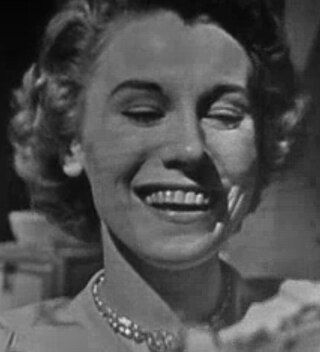
Margaret Phillips was a Welsh-born actress who was active on Broadway from the 1940s and in television in the 1950s and 1960s.

Grey Blake (1902–1971) was a British stage, film and television actor.
















